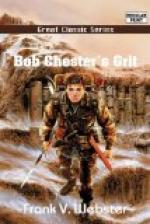“You won’t lose by leaving the matter of wages to me, boy. Don’t you worry about that, no matter what Ned Higgins or his cronies tell you.”
“I shall not discuss my affairs with outsiders,” replied Bob with seriousness that brought a smile to the plainsman’s face.
“Good! Now, let’s get down to business. Can you ride?”
“No. But I can learn.”
“You’ll have to. A man on a ranch who can’t ride is about as useless as a rifle without cartridges. Let’s see, you’ll need a safe pony to learn on. I guess I’ll let you try old Sox. He never was mean and he still has some speed. Pick up that saddle there,” and he pointed to what is called a Mexican saddle, which has a high pommel and back; “the bridle is tied to it, and we’ll go out to the corral. You ought to get so you can do pretty well by night. You’ve got to, because I need another puncher with my short-horn herd over by Red Top.”
The thought that he was to be stationed close to the town that might hold secrets of the greatest importance to himself so excited Bob that his hands trembled as he seized the saddle.
Attributing this action to fear of the broncho, Ford said:
“You sure ain’t scared of riding a pony when you faced Chester, are you?”
“No, I’m not.”
“Then why are you trembling so?”
“Oh, because I’m so happy at having found a job, I guess,” dissembled Bob. And then, in order to direct the ranchman’s attention from himself, he asked:
“Why do you call your dog Chester?”
This question served Bob’s purpose better than he could have desired, for it caused the grizzled plainsman to start suddenly.
Instantly recovering himself, however, he countered by demanding sharply:
“What makes you ask that?”
“Because it’s such a queer name for a dog.”
“Well, he’s a queer dog,” returned Ford tersely. “Now, come along with that saddle.”
As though aware of their purpose, the dog had preceded them from the cabin, but as Ford and Bob stepped forth, he stopped, began to sniff the air and then emitted a long, low growl.
“Somebody’s coming,” announced the ranchman, pausing and following the direction of the wolfhound’s gaze.
Eagerly Bob did the same, and in a few moments beheld a man riding a horse and leading another.
Instantly it flashed to the boy’s mind that the horseman was his friend the station agent, who, having learned his destination, had followed, and he exclaimed:
“That’s Hal Thomas!”
“What makes you think so?” demanded Ford sharply.
“Because he’s a friend of mine and he was trying to buy a horse for me when I started for your ranch.”
“Well, you couldn’t have a better friend,” asserted the ranchman.
During this colloquy the dog had set up a furious barking and snarling, leaping about in evident readiness to spring upon the horseman when he should get well within the clearing.




